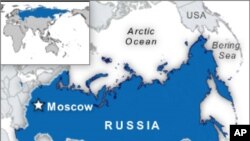Russia has long been known for being the land of bureaucracy, but lately red tape has taken on a whole new meaning for foreign workers. It is all because of a four-year-old law that is suddenly being enforced.
The line at the central migration office in Moscow is nearly out the door. One can see the anxiety on people's faces as they approach the window.
Most foreign workers accept that they have a daunting task to obtain a visa and maintain their legal status in Russia. For example, forms must be filled out in triplicate with the proper signatures, and government forms can change on a weekly basis, without notice. Fill out a wrong form and your visa is denied.
Every foreigner must register with the central migration office within three days of arriving in Russia. If they fail to do so, they are issued an exit visa. Furthermore, foreigners with a work visa have to let the migration office know if they are leaving the city they are authorized to work in, failure to do so could result in a fine, arrest or both.
If that is not enough to worry about, a newly enforced, existing law requires foreign workers to get their college diplomas notarized in the country where they received them, and then get a stamp from that country's foreign ministry.
An official stamp is often used by governments as proof that an important document or a signature is real. It is usual for many countries to require these stamps for things such as medical certificates or legal documents, but not college diplomas.
German Robert Zellner has been working for an international hotel chain in Moscow for nearly three years.
"Now, all of a sudden I have to fly to the United States, where I went to college, and get my diploma stamped and double stamped, in order to keep my own job? Who is gonna pay for this?" Zellner asked.
Moscow-based political analyst Mascha Lipman of the Carnegie Center, says she thinks the recent enforcement of the obscure law is just the government's way of making it difficult for foreign workers to stay in Russia.
"These recent hurdles have to do with historic, traditional Russian xenophobia. Suspicion of people, from abroad, coming to Russia doing something in Russia. This has to do with the Soviet experience. This was a closed country in which people could not leave or come freely," Lipman said.
Zellner agrees and says he feels the government is trying to weed out foreigners.
"I was given very little notice that I needed to get this stupid stamp. I mean, I just cannot leave the country and do a stamp run. But I could lose my job if they do not give me enough time," Zellner said.
And, he could face some trouble meeting the requirement. Stamps often take up to eight weeks to get. Scotland native Euan Crawford says he was only given two weeks notice. He is vice president of an accounting firm in Moscow.
"It got to the point that the office was considering buying me a degree from a university in eastern Russia, because it was going to be cheaper than getting my degree certificate to the notary and then getting it apostulated, and then getting it to Russia," Crawford said.
Human Rights Watch Moscow office director Allison Gill says the law is being enforced now because Russia does not need foreign experience like it used to.
"You know, there was a time in the early '90s when a foreign worker was actually sought out; particularly in business, in consulting and finance. Then as the Russian economy got more on its feet and Russia resurged in all kinds of ways the pendulum swung the other way," Gill said.
Zellner agrees, he says he is regularly reminded his Russian boss prefers to work with her fellow countrymen.
"I cannot tell you how many times I have been told that Russia is for Russians and that we are taking their jobs. They do not really want us," Zellner said.
Russian officials say they are not trying to harass foreign workers. They say the diploma certification requirement is a way for foreign workers to prove they are qualified for the job.
There is some suggestion Russian authorities may be easing up a bit on what many analysts say is their unwelcoming stance. President Dmitry Medvedev recently encouraged authorities to be more hospitable to foreign workers, and hinted at easing visa regulations within the next year.
Foreign Workers in Russia Face Sudden Red-Tape Barrier

Sudden enforcement of four-year-old visa statue may signal new Kremlin effort to discourage foreign presence in Russia







